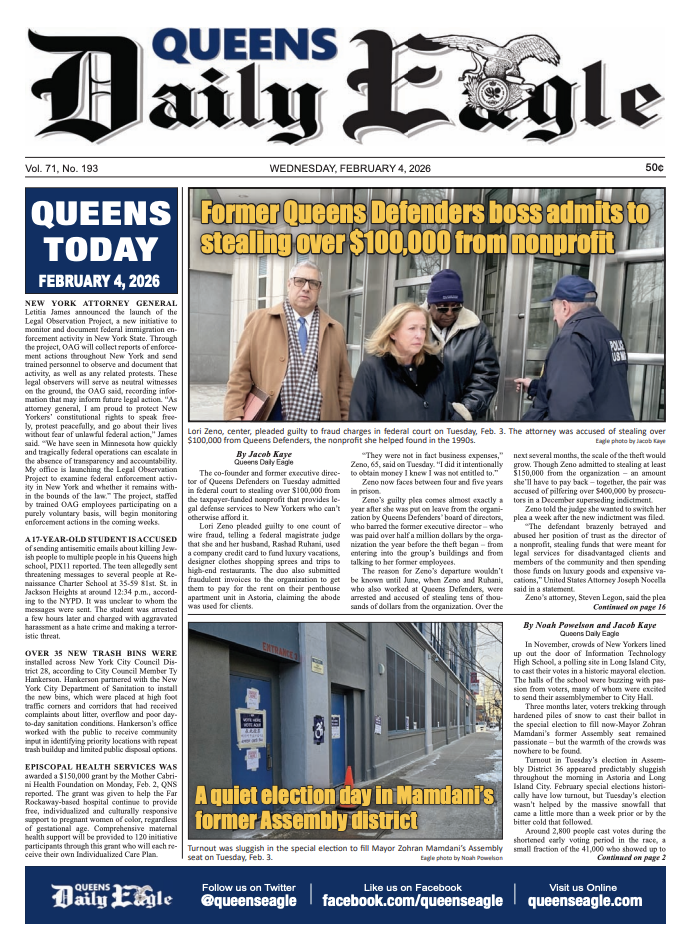Ambiguous clause inspires debate over 'Raise the Age' law
/Judge Edwina Mendelson, the Deputy Chief Administrative Judge for Justice Initiatives, speaks at a Raise the Age forum Monday night in Jamaica. Eagle photo by David Brand
By David Brand
A Southeast Queens forum on the state’s new Raise the Age law, which moves the majority of children’s misdemeanor and felony cases to Family Court, inspired pointed debate about what kind of cases the Queens District Attorney’s Office says should remain in Criminal Court based on an ambiguous “extraordinary circumstances” provision.
The forum, organized by Queens Supreme Court Justice Chereé Buggs during the 113th Precinct Community Council meeting Monday night, featured the judge who oversees Raise the Age and a panel of prosecutors, defense attorneys and community leaders who described the law’s implementation, its consideration of adolescent brain development and its impact on recidivism.
“Young people are unusually ripe for intervention,” said Judge Edwina Mendelson, Deputy Chief Administrative Judge for Justice Initiatives, which oversees Raise the Age. “If we don’t intervene, they won’t become full members of our communities.”
Raise the Age created a new category of defendants known as Adolescent Offenders (AOs) — 16- or 17-years-olds who are charged with a felony and face adult sentencing — and stipulates that AOs be removed to Family Court unless they are charged with a violent felony. In such cases, removal to Family Court hinges on a three-point test: whether the AO allegedly used a weapon, whether the alleged offense was a sex crime or whether the defendant caused significant physical injury, the law states. The law currently applies to 16-year-olds and will expand to include 17-year-olds in October.
The law also gives prosecutors significant discretion to prevent a case from being removed to Family Court based on an “extraordinary circumstances” provision, which gives prosecutors 30 days to apply for a case to remain in Criminal Court. Judge Lenora Gerald, who presides in the new Youth Part located in the Kew Gardens courthouse, makes the ultimate decision.
Defense attorneys and advocates at the event criticized the ambiguity of the provision.
“Cases are not just going to Family Court,” said Legal Aid attorney Samantha Seda. “We’re fighting them every step of the way.”
Queens defense attorney Victoria Brown Douglas asked representatives from the Queens District Attorney’s Office if there is a “policy statement” outlining what kind of cases they would attempt to keep in Criminal Court.
“You have the bench willing to work with kids and Probation working overtime,” Brown Douglas said. “So why is the Queens DA’s Office under Richard Brown still criminalizing our kids?”
Before assistant district attorneys Laura Henigman and Ann Marie Mullaney could respond, Mendelson interjected.
“You cannot policy this away,” Mendelson said, adding that young people can appeal the decisions they disagree with. “The justice system allows them to do it.”
She said she has so far compiled seven cases where a defendant appealed a Youth Part judge’s decision to keep a case in Criminal Court.
“It is the legislature that has to come back and tell us what they mean by ‘extraordinary circumstances,’” added Executive Assistant District Attorney Jesse Sligh, who was seated in the audience. “We don’t know what ‘extraordinary circumstances’ means either.”
Between Oct. 1 and Dec. 31, 2018, Queens had 56 total Raise the Age cases; 32 were removed to Family Court, 15 remained in Criminal Court, three were voided and the DA’s Office declined prosecute six others, according to data from the Queens DA’s Office.
In 2019 so far, Queens has had 29 total Raise the Age cases, of which eight were removed to Family Court, eight remain in Criminal Court, three were voided and the DA’s Office declined to prosecute six, the Queens DA’s Office said.
“Unfortunately, this new legislation fails to define ‘extraordinary circumstances.’ We are going to have to determine what it means on a case-by-case basis,” a Queens DA spokesperson told the Eagle in November. “We would take into account such things as the type of crime committed; the defendant's criminal history, if any; any injuries to the victim; and any other pertinent information surrounding the commission of the alleged crime. There is no one specific thing that we can point to that would tell us that we have a case with ‘extraordinary circumstances’ nor can we tell with specificity in what types of cases we would be filing such a motion.”.
Henigman briefly explained what motivates the DA’s Office to argue for a case to remain in Criminal Court. She specifically cited a case involving a young person charged with “five armed robberies” where the weapon had not been recovered as an example.
Raise the Age also moved children under age 18 off Rikers Island and into separate juvenile facilities — a key development that received little attention at the forum except in the words of one young person.
At 17, Kevin A. was detained on Rikers Island for six months for an assault charge that was eventually dismissed after the victim came forward and said Kevin was wrongfully accused.
“He spent six months fighting a case that ended up getting dismissed,” said LIFE Camp Deputy Director Tiffany Williams, who read Kevin’s written testimony. “Six months is a lot for [adults], but it’s a lot more for someone who is still developing.”
This story has been updated to reflect the most current data on Raise the Age cases in Queens.




